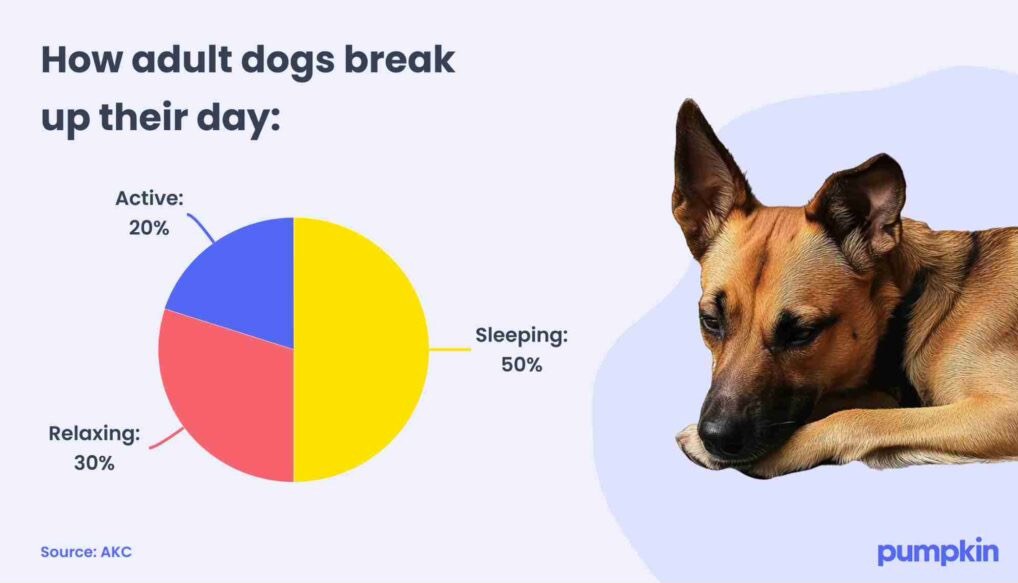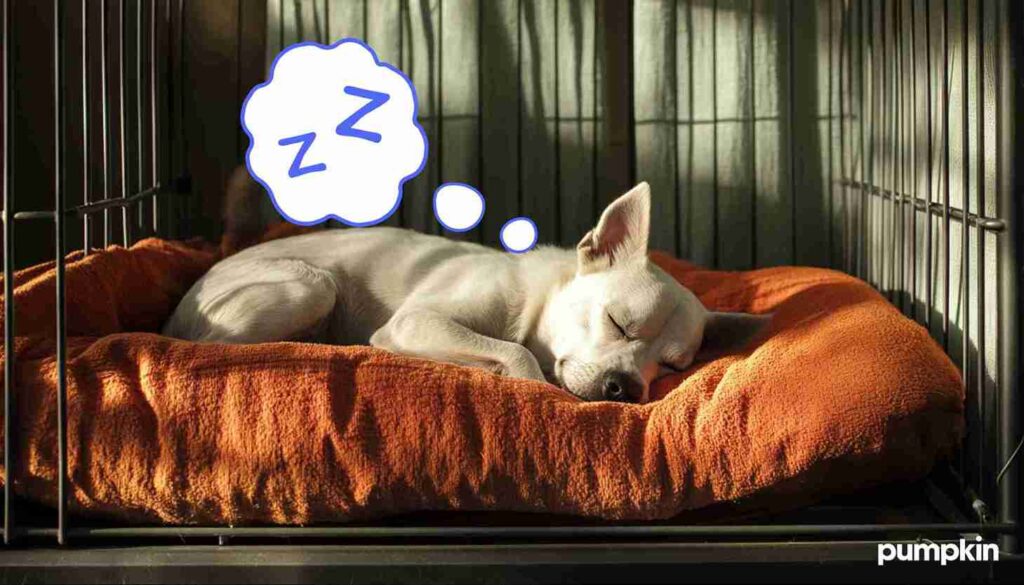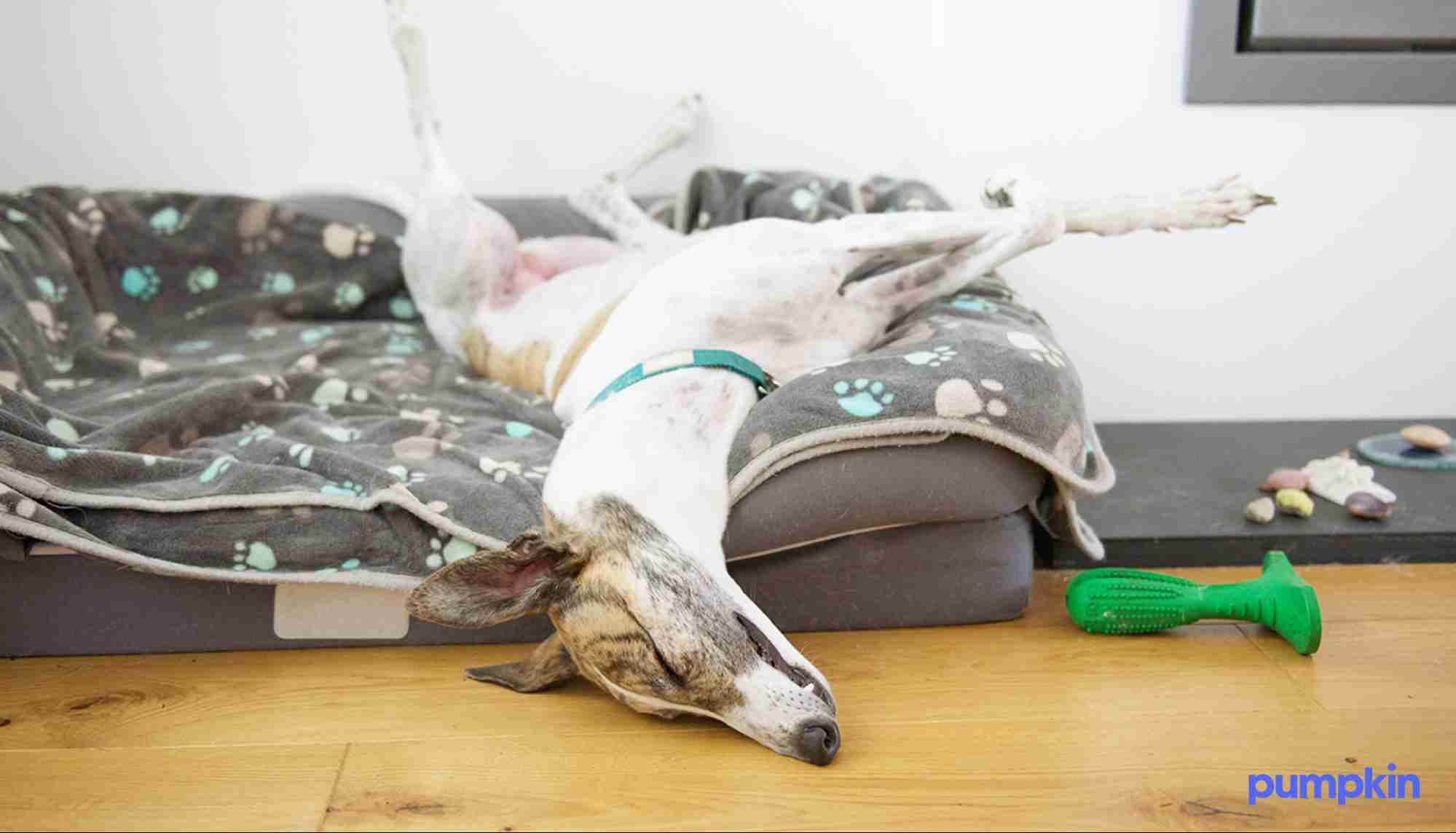Key Points
- Puppies and senior dogs need the most rest, but factors like breed, exercise, and health all affect how much sleep your pup needs.
- If you’re worried your dog is sleeping too much, look for signs of stress, indicators of illness, or a change in their sleep schedule or appetite.
- Find a cozy dog bed and let your pup out to potty at the end of the night to help them sleep well.
Have you ever felt exhausted at the start of a busy morning, and felt a tinge of jealousy as you watched your dog sleep the day away? If this envy has ever led you to wonder, “Why do dogs sleep so much?”, it’s not just because they have all the time in the world to do so.
If your dog seems to be sleeping all the time, it’s not because you have the cutest and laziest dog in all the world (though, technically, you might). The simple fact is dogs need more sleep than we do. We can get by with 6-8 hours per day, but our pups need twice as much.
Let’s compare our sleep habits to our dogs’ to see what causes this discrepancy.
How much sleep does your dog need?
Dogs’ sleep needs change as they age, but puppies, seniors, and sick dogs require the most sleep.
That new trick you taught your puppy? He’s going over it in his dreams and will have it perfected soon. Sleep is also the time for the growth and repair of muscles and tissues. If your adult dog is active or a working dog, sleep allows them to keep going day after day, waking up alert and ready.
Here are some basic guidelines around how much sleep dogs need as they age:
Puppies
Puppies require the most sleep, and it’s understandable. Dogs learn while they sleep, and puppies have tons to learn! Their growing bodies and brains require 18-20 hours of sleep per day.
You may even notice your puppy flopping over to take a snooze in the middle of playtime. However, as they reach 12 months of age, their sleep habits should resemble an adult dog’s.
Adults
Adult dogs “appear” to sleep most of the day, but it breaks down to:
- 50% spent sleeping (mostly at night)
- 30% in a drowsy, lounging state (one eye is always on you, right?)
- 20% being active
They will only spend about 3 hours sleeping during the day; the rest is that relaxed, lounging period.

Seniors
Senior dogs will spend more time sleeping during the day to stay alert when their humans are around. Why do dogs sleep so much when they get older? Senior dogs’ energy levels decrease, which is a normal part of the aging process.
As dogs reach the end of their life, they can also suffer from cognitive decline. If your senior dog has started wandering around in the middle of the night instead of sleeping soundly, check in with your veterinarian.
Is my dog sleeping too much?
When you’re running around all day and your pup is snoozing for hours on the couch, it can be easy to worry if their sleeping is excessive. But if they’re only active 20% of the time, you can relax, as this behavior is normal for the majority of adult dogs. And if you have a senior pup, it’s likely they’ll be moving around even less.
What’s “normal” really depends on the individual dog. But there are a few warning signs you can look for that might indicate your dog is sleeping more than they should.
If you’ve established a regular sleep schedule and their behavior changes suddenly (i.e. they start wandering around in the middle of the night), that may mean something’s wrong. Watch out for signs of stress or illness (such as peeing inside at night); a health issue may be interrupting your pup’s nighttime sleep.
If you suspect something’s wrong, your vet can help.
Reasons your dog sleeps so much
Age, personality, breed, health, and activity levels can cause your dog to sleep deeper or be more restless. Let’s look at why.
Breed: Giant dog breeds require more sleep than smaller breeds. Newfoundlands, Mastiffs, Elkhounds, and St. Bernards are good examples.
Age: Puppies and senior or adult dogs with illnesses tend to sleep more. But puppies usually sleep the most (and in the silliest positions).
Exercise: Dogs who are active will sleep more deeply, with less relaxed or lounging periods.
Environment: Dogs also sleep better when they’re at home. For our dogs, new environments with lots of unfamiliar noises, people, and smells can disrupt their sleep cycle.
Depression: Yes, dogs can get depressed. If your pup seems unusually lethargic, it’s possible they’re experiencing canine depression. Other signs include a low appetite, clinginess, and an unwillingness to participate in activities that used to excite them.
Sleep disorders: Just like humans, dogs can have medical conditions that impact their ability to sleep deeply. They can suffer from medical conditions such as:
- Narcolepsy, which is common in Doberman Pinschers and Labrador Retrievers
- Obstructive sleep apnea, which is less common overall
- Hypothyroidism, a condition that causes your dog’s thyroid gland to underperform, slowing their metabolism
- Chronic pain can keep dogs from resting well. Pain from osteoarthritis in older dogs can interfere with sleep.
Pet Pro Tip: Illnesses won’t wait to happen, and having a pet insurance plan in place can cover crucial eligible treatment your pet may need for their unexpected accidents and illnesses. Find out how Pumpkin pet insurance plans can help your pup get the best in care.
Understanding canine sleep cycles
Dogs are polyphasic sleepers, meaning they sleep on and off during the day. They can also sleep anywhere and anytime. Humans are monophasic sleepers because we sleep in one long block of time at night.
Both species enjoy Rapid Eye Movement (REM) and non-REM sleep cycles (deep sleep).
Dogs have shorter sleep cycles that last only 45 minutes at a time. During that time, they will cycle through REM and non-REM sleep twice, spending about 6 minutes in the REM (or dream) stage.
On the flip side, humans’ sleep cycles last 70-120 minutes, and we’ll cycle through REM and non-REM stages several times. As the night goes on, our REM cycles will get longer, until that pesky alarm disturbs us.
How to help your dog sleep better

Dogs thrive on routine, and a regular schedule of sleeping, eating, exercising, and playing will improve their sleep habits.
Letting them relieve themselves right before bed should help them sleep through the night — unless, of course, you have a puppy or senior dog, who may need to go out more often. You can also provide a comfy dog bed.
Sweet dreams, night and day
Your beloved pooch may sleep more than you do, but really they’re just sneaking in as many naps as possible amongst all the playtime and attentive companionship.
However, if you still think your dog is experiencing excessive sleep or not sleeping enough, talk to your vet. Dogs will hide illnesses, and sometimes a change in their normal sleep patterns can be a sign that something is wrong.
FAQs
- https://pubmed.ncbi.nlm.nih.gov/28165489/
- https://www.akc.org/expert-advice/health/why-do-dogs-sleep-so-much/
- https://sootheandsettle.com/blogs/anxiety-in-dogs/understanding-sleep-cycle-in-dogs
- https://www.akc.org/expert-advice/health/how-to-know-if-your-dog-is-depressed/
- https://vcahospitals.com/know-your-pet/narcolepsy-in-dogs
- https://pubmed.ncbi.nlm.nih.gov/35576395/
- https://www.merckvetmanual.com/endocrine-system/the-thyroid-gland/hypothyroidism-in-animals
- https://www.nature.com/articles/s41598-021-04502-2




